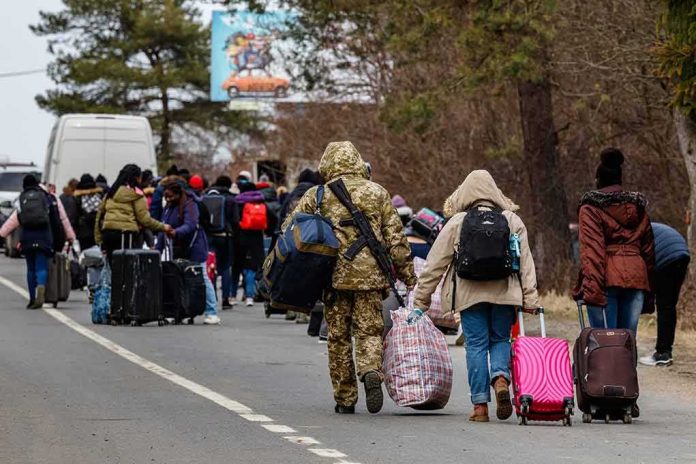
A sweeping federal budget law threatens to strip food assistance from America’s most vulnerable refugee populations, marking the first wave of cuts that could eventually impact millions of citizens.
Story Overview
- Republican-backed budget legislation targets refugee food stamp benefits for elimination
- Changes create immediate survival challenges for displaced families already struggling to rebuild their lives
- Refugee cuts serve as a testing ground for broader food assistance reductions affecting all Americans
- Fear and uncertainty spread through refugee communities as they face potential loss of basic nutrition support
The One Big Beautiful Bill Takes Aim at Refugee Support
Republicans have branded their comprehensive budget legislation the “One Big Beautiful Bill Act,” but for refugee families across America, the name feels like cruel irony. The legislation specifically targets food assistance programs that provide basic nutrition support to refugees who fled persecution and violence in their home countries. These cuts represent a deliberate policy choice to prioritize budget reduction over humanitarian assistance for people who already survived unimaginable hardships.
Refugees Face Impossible Choices
The impending food stamp cuts force refugee families into devastating decisions between rent, medical care, and groceries. Many refugees work multiple low-wage jobs while learning English and navigating complex American systems, making every dollar crucial for survival. Without food assistance, parents must choose between feeding their children and paying for transportation to work, creating a spiral that threatens their ability to achieve self-sufficiency and contribute to their communities.
Testing Ground for Broader American Cuts
Refugee populations serve as the perfect political testing ground for food assistance cuts because they lack voting power and organized advocacy networks. Politicians can gauge public reaction to benefit reductions without facing immediate electoral consequences from affected populations. The strategies and justifications used to cut refugee benefits will likely be recycled when targeting food assistance for American citizens, making these cuts a preview of coming attractions rather than an isolated policy change.
Community organizations report that refugee families are already reducing meal portions and skipping meals in anticipation of benefit losses. Children arrive at school hungry, and parents skip meals entirely to ensure their kids eat something. This manufactured crisis demonstrates how quickly government policy changes translate into real human suffering, particularly for populations with limited resources and support networks.
Political Calculations Behind Human Costs
The decision to target refugees first reveals the cold political calculus behind budget cuts that claim fiscal responsibility while ignoring human consequences. Refugees cannot vote, rarely have established political connections, and often struggle with language barriers that limit their ability to advocate for themselves. This makes them ideal targets for politicians seeking to demonstrate toughness on government spending without facing organized political opposition from affected communities.
The fear spreading through refugee communities extends beyond individual families to the broader network of resettlement agencies, churches, and community organizations that support integration efforts. These groups now scramble to fill gaps left by government cuts, straining their own limited resources and potentially reducing their effectiveness in helping refugees become self-sufficient contributors to American society.
Sources:
Refugees will be among the first to lose food stamps under federal changes







